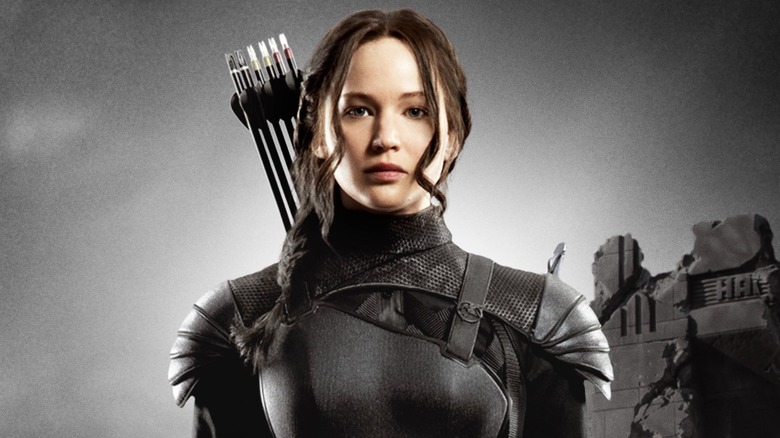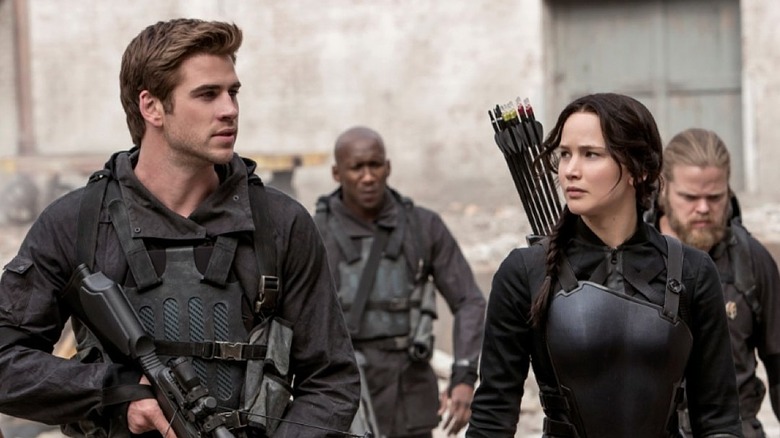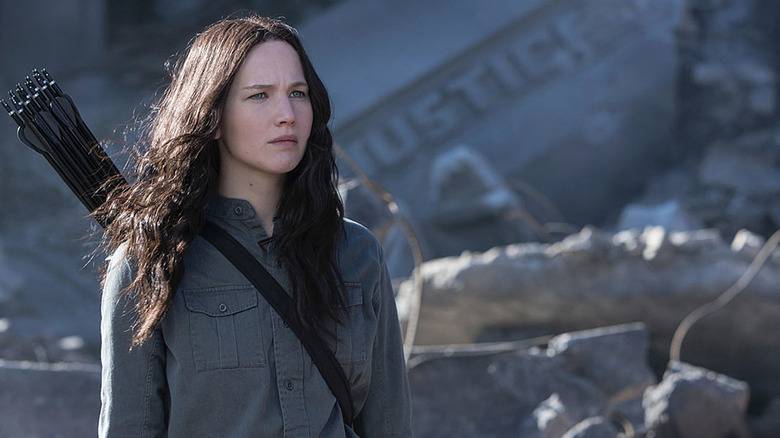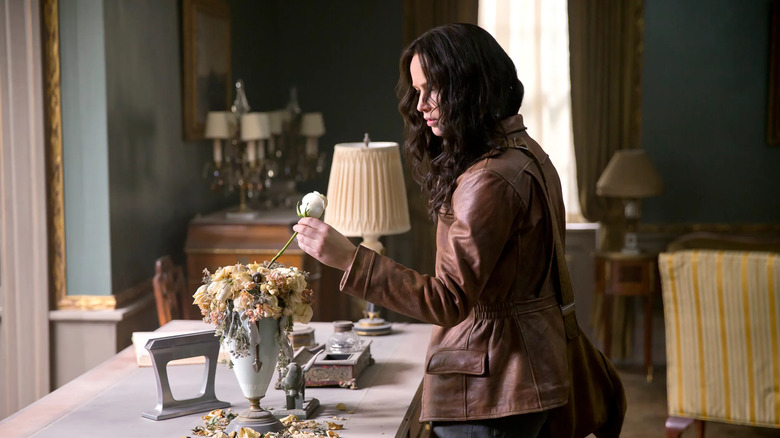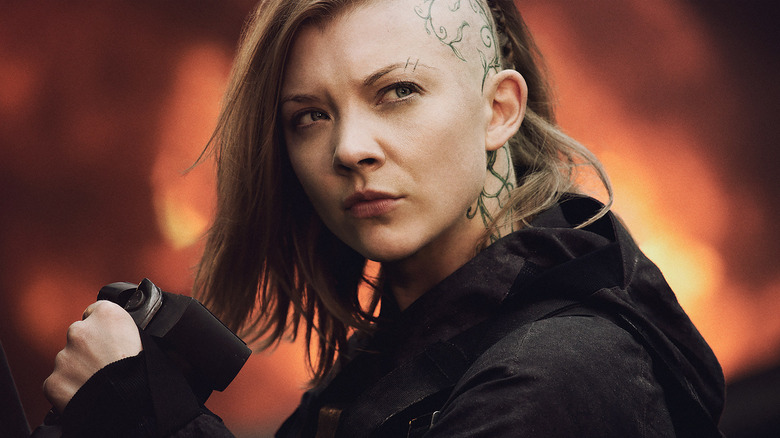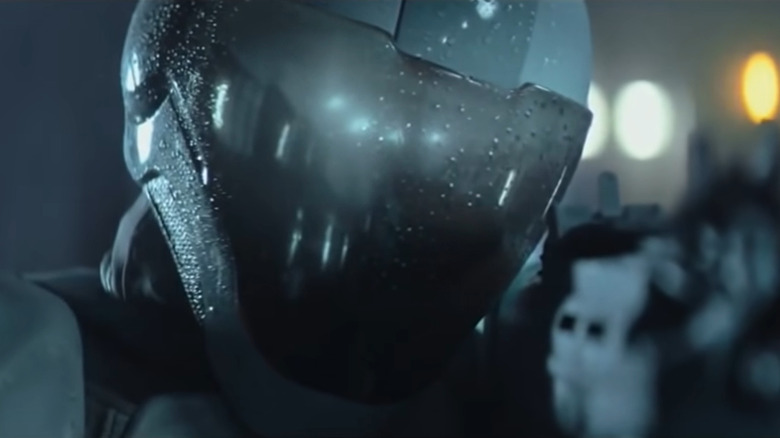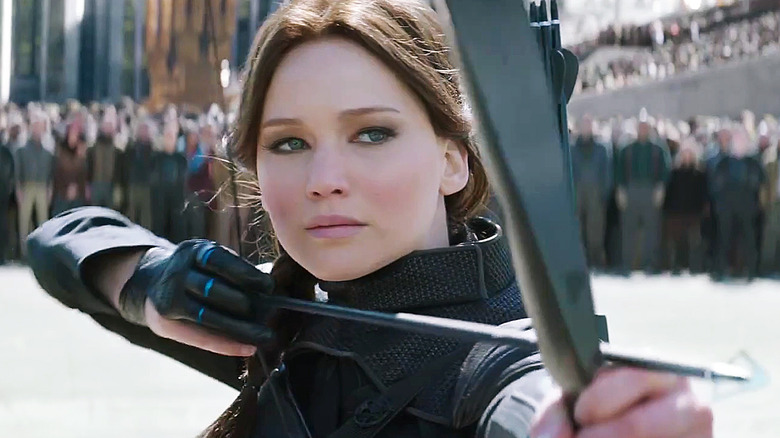The Hunger Games: Mockingjay — Part 1 Is Better Than You Remember
Ten years ago, "The Hunger Games" premiered to massive box office success. A year and a half later its sequel, "Catching Fire," performed even better. With its star-studded cast, shocking premise, and social commentary that was a lot more substantial than what people generally expected from a YA (young adult) book adaptation, these first two movies made a major impact on pop culture at the time. The three-fingered salute characters used in the movies to show solidarity with each other was adopted by real-life activists all over the world, and throughout the early 2010s it felt like the hype was here to stay.
But in November of 2015, the "Hunger Games" franchise ended with what felt like a whimper. "The Hunger Games: Mockingjay – Part 2" had a decent performance at the box office, but was still a 34% decline from the performance of "Catching Fire," and far below what you'd expect from the final installment of a major franchise. ("Deathly Hallows: Part 2" was easily the highest performing movie of the series, for instance.) By the time the franchise wrapped up its final movie, it felt like the world had gotten bored and moved on.
The disappointing third entry
The apparent "Hunger Games" fatigue that set in towards the end of the series is often attributed to the decision to split the final book in Suzanne Collins' trilogy, "Mockingjay," into two parts. At a time where every book-based franchise seemed to be splitting its final book in two (or three, in the infamous case of "The Hobbit"), fans and critics were frustrated when Lionsgate made the same decision. "There was no need for 'The Hunger Games: Mockingjay' to be split into two different films," one critic argued, and she was hardly alone in the claim. While "Harry Potter and the Deathly Hallows" was long and event-packed enough that even the most cynical critics could begrudgingly admit the need to split it in two, "Mockingjay" the book was the same basic page length as the first two installments.
Despite this, I'll admit I'm still a little confused as to how everyone was so certain "Mockingjay" could've easily been one movie. It may have been the same page length as the previous books, but the movie introduced a whole new setting of District 13, featured events happening outside of Katniss's POV that a movie would have to cover, and the plot culminated around the major deaths of characters like Prim and Finnick, who hadn't made that big of an impression yet, and President Coin, who hadn't even been introduced at all in the first two films.
Yes, they technically could've done what the "Harry Potter" movies did with "The Goblet of Fire" and squeezed the whole book into a single two-and-a-half hour movie, streamlining and condensing everything until it was a chaotic, confusing mess. But would anyone have actually liked that version of "Mockingjay"? Two of the most memorable scenes of Part 1, (the "Hanging Tree" montage and Peeta's rescue mission) would certainly have had to have been cut. And Finnick's death scene would've meant nothing, because half the viewers wouldn't have even remembered his name.
Instead of creating a final installment that raced through every impactful moment, director Francis Lawrence did something way more interesting. He gave us two thoughtful, mature films with meaningful things to say.
Understanding the point of the novel
One of the reasons "Mockingjay" the book disappointed so many when it came out was the feeling that Katniss never really rose to the level of heroism fans were hoping for. Instead, Suzanne Collins took the famous saying, "What doesn't kill you makes you stronger," and stomped all over it. As it turns out, Katniss did not grow to become a stronger person after the events of the last two books (in which she was forced to murder other kids, then other adults, and then had her hometown bombed to pieces). By the end of "Mockingjay" she's tired and scarred, with none of the energy or defiance that made her so exciting to follow in the first book.
Whereas many other YA series are about how a person can accomplish great things through bravery and perseverance, Collins was more focused on showing how turning someone into a figurehead for an entire revolution is way too much to put on them. Katniss buckles under the weight, and as the war rages on in the background, the narrative is primarily focused on her attempts to stay sane and find a semblance of control over her personal situation.
Maybe this is part of why fans of the "Hunger Games" books, especially the many who considered "Mockingjay" the weakest of the three, were so emphatic about the idea that it only should've been one movie. If they hadn't split the book in two, there wouldn't have been enough time to fully embrace this aspect of it. Instead of dwelling on Katniss's inconveniently unpleasant mental space, the movie would be forced to focus purely on the rebellion itself. But the war, while exciting, was never really the core of the trilogy.
After all, the books are purely told through Katniss's limited perspective, whereas the movement behind the rebellion is made up of a broad coalition of people. Readers at the time often argued that Collins should've switched up this format in the later books so we could see more of the action, but to do that would've been to not tell the story Collins was interested in telling.
Dwelling on Katniss's PTSD
Instead of providing any climactic showdown between Katniss and President Snow, the third installment of the "Hunger Games" franchise follows Katniss as she struggles to stay sane. The opening of the film finds her alone in a dark room, talking to herself: "My name is Katniss Everdeen. My home is District 12. I was in the Hunger Games. I escaped. Peeta ... Peeta was left behind..." This is a coping mechanism taken straight from the book, a technique Katniss uses to keep herself from reliving the horrific moments from the past.
One of the hallmark symptoms of severe PTSD is the way that sufferers experience flashbacks so vivid and painful that they feel as if it's happening to them right now, even though the actual danger has long since passed. It's why Katniss constantly needs to remind herself where and when she is. "Mockingjay — Part 1" understands and depicts this constantly, clearly, with a level of respect for what Katniss is going through that so few other YA adaptations have ever done. Even when Katniss's breakdowns are irrational, like when she sees the scattering of white flowers sent from President Snow to provoke her, it's never depicted in an unsympathetic way.
The first half of the book is an intentionally frustrating read because of how powerless Katniss feels. Peeta's been kidnapped by the Capitol, likely being tortured for months on end, and there's nothing she can do about it. It feels repetitive and aimless because that's exactly how it feels for Katniss. It might not be the most pleasant read, but it's something Suzanne Collins clearly wanted to explore and a feeling she was successful in capturing.
There's something kind of cathartic about watching Katniss push through the frustrating, seemingly impossible situation she's found herself in. There are plenty of setbacks, (including one massive setback with the reveal of the new Peeta), but Part 1 is all about Katniss's slow mental adjustment to the horror of her new situation, getting her to a place where she's capable of fully becoming the Mockingjay figurehead everyone keeps wanting her to be.
The propaganda war
The genius of Part 1, however, comes from the way Katniss's PTSD interacts with the propaganda war she's been trapped in. Part of what the Mockingjay role involves for Katniss is making big, emotionally compelling speeches that will motivate people in the district to fight. The problem is that Katniss isn't a good actor, and they aren't able to make any usable content unless Katniss is truly feeling what she's saying. So what do they do? They drop her into an actual war zone, and when Katniss sees a hospital full of wounded soldiers and civilians get bombed by the Capitol, they get the cameras rolling on Katniss's face and make her talk about it.
When Cressida (Natalie Dormer) turns on the cameras and asks Katniss to "tell us how you feel," it almost feels cynical. You're almost tempted to hate Cressida for essentially mining Katniss's trauma for content, but the film ultimately sides with her pragmatism. She sees an opportunity to help the Districts, and she takes it. The large-scale benefits of the propaganda she's making outweigh than the tactlessness of using this tragedy as a tool.
Near the beginning of the movie, Plutarch (Philip Seymour-Hoffman) asks the others to "think of one incident where Katniss Everdeen genuinely moved you. Not where you were jealous of her hairstyle or her dress went up in flames or she made a halfway decent shot with an arrow. And not where Peeta made you like her. No, I'd like you all to think of one moment where she made you feel something real."
The two moments he gets as an answer are when Katniss volunteered to take her sister's place in the games, and when Katniss sang a song in response to Rue's death. Both of these are moments are up high on the list of worst things that ever happened to her, and they're spoken of in this scene like they're nothing more than TV gold.
The cynical optimism of "The Hanging Tree"
This contrast is best shown in the "Hanging Tree" montage. Katniss sings a song she learned in her childhood, that's basically about two people who are executed for being involved in some kind of murder. Clearly the song carries weight to Katniss, and the propaganda team take advantage of that straight away. They have her sing the song, casually changing some of the lyrics to better fit the mood of rebellion, and broadcast the song throughout the districts.
The use of the song, from beginning to end, is tactical and manipulative, and yet it works not just for the rebels but for the audience. The sequence where the rebels chant the song before charging the dam, none of them hesitating even as so many of them are getting gunned down around each other, is one of the most poignant and powerful sequences in the entire series. We know the song isn't an organic piece of art, that its original meaning has been reappropriated by an authoritarian leader in order to better motivate the masses to sacrifice their lives on her behalf, and yet it's still genuinely moving.
"Mockingjay — Part 1" is special because it's the film in the franchise that really dives head-first into the murkiness of political propaganda, both critiquing how manipulative and hollow these tactics are while also acknowledging how powerful they can be. What makes it better is the realization that most of this (especially everything involving "The Hanging Tree") would've 100% been cut if "Mockingjay" had only been one movie.
Changing the way we see part ones
One of the most telling moments in how "The Hunger Hames: Mockingjay — Part 1" was set up to fail in the eyes of critics and general audiences was in the Honest Trailers take on "Catching Fire:"
"So, experience a film that's ultimately just a commercial for the next film ... which will ultimately just be a commercial for the next film."
Although channels like Honest Trailers are best not taken too seriously, this line does touch on the unhealthy, disproportionate amount of importance we tend to place on the end of a story. The way critics and audiences talked about part one, you'd think that the only value the first half of a story holds is that it sets up the second half. They don't look at "Mockingjay — Part 1" and appreciate the emotional character arcs, the deep dive into political propaganda tactics, the meditations on trauma and survivor's guilt. They look at it and just see something they have to get through to reach the ending, which apparently is the only thing that really matters. When it comes to the general discourse around adaptations like this, it's not the journey that matters, just the destination.
Once you get rid of that mindset, if you go into "Mockingjay — Part 1" willing to take it as it is, you'll probably find that it's not as slow or as drawn-out you might remember it. Maybe it's not effective as a bombastic, fast-paced war movie that answers all the questions people had after "Catching Fire," but that was never the movie it was trying to be.
